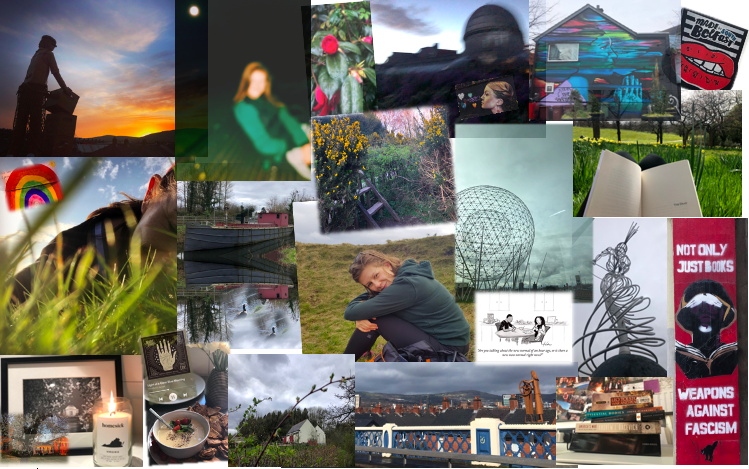Rachel Thompson
BA (JS) Student in History and Social Anthropology
28/04/2020
I am not affected by COVID in a way that will cause me great trouble later in life. It’s been interesting to keep up with the science of it all and its not been too bad student-ing from home. However, something occurred to me recently as I was sitting in my family home having dinner with my parents. What did not occur to me was gratitude; an emotion that must be stalked and snagged, and forced into the centre of one’s mind. Gratitude is only achieved through painful activities, the likes of which, annoyingly, I ought also to be grateful for like meditation and prayer. What occurred to me was how much time I had lost with my friends in Belfast, and how this, the summer after my final year was time I would never get back.
So here are the mitigating factors: this is where I am wrong and stupid. Allow me to lay it out, to bear my sins before the group and be judged accordingly:
· I’m ungrateful for the family and the home that I have.
· I’m secure and I will nor starve or freeze, or probably (due to my age and lack of cardiovascular problems and age) die of COVID or any other infectious disease.
· I am not newly exposed to danger in a low wage, low status job like people in Tesco or Asda (or whichever supermarket is pertinent to you, oh reader, I’m not leaving you out in sentiment just because I left you out words).
· I’m not even grateful that I’m not sick, I take it for granted that I will be healthy throughout this.
· If I do get sick, I know there will be people to care for me, family and NHS.
· I am not at huge risk of high viral load and therefore a more complex illness like heath workers and teachers.
· I have no dependents, no fat coocoo has landed on me, beak open, demanding to be housed and fed…guilty as charged.
· I am not a significant other to someone pregnant nor am I pregnant myself.
· I have not been put into any financial hardship.
· I am not a business owner forced to put others into financial hardship.
· More good news! My submissions were pushed two weeks later than they otherwise would have been…
· one was reduced in length
· All the emails I get are about the understanding of the difficulty of these, and I hate to repeat this ubiquitous phrase, “unprecedented times”.
There! I said it! I’m an ingrate! I even bought a new smartphone this week, this is the lap of luxury…yet seen as the thought flashed across my brain, from whence it came or to whence it went no one knows, I allowed this nymphic spark to be a cantankerous and unreasonable one.
‘This blows, and I hate it and I want there to be a responsible person in front of me so that I might kick them in the shins with big steel-toe boots’.
I am a child having a tantrum even as I recognise I am a grown up watching that child. I was planning a huge party with all the friends I’ve made over three years of work at this uni. I was even planning on being quite happy about my achievement of not dropping out, despite weekly threats to the contrary. At Uni learned to cook, I learned to plan my days, I learned how to fight for myself. I wanted to have a right roaring ol’ pat on the back, and I had reasonable hopes of getting just that. Even what I wanted now sounds disgustingly self-gratifying.
In the ignorant fog of youth, I wasn’t full of all this icky introspection and self-critique; I’ve developed that, I’ve learned how to think, and follow up the thought with why I’m thinking like that. I’m almost a civilised person in a room now, and believe it or not sometimes I have a conversation with people that I can look back on and be proud of. Thank God. Listen, there is much to be grateful for in this, there are new friends to make and new adventures to pursue. I know it, I spend time and take pictures of flowers and hug my family… but, would it be okay to allow myself, for these next months are so significant to me perhaps, to be upset? If you can get on with reading and research then good for you, and post on the forum about how interesting this all is then good on you, great attitude and congratulations on your well-formed character. Really (I know tone is hard in text), but I do mean good for you, I read and am glad to know you are inspired by this new world as you have been in the old one to explore all that good academic stuff. This is not how I feel about **LOCKDOWN** most of the time, and I have a tenancy to decide to handle something one way, and then decide that I’m weak and morally compromised for doing it another way. In spite of all the good things I have, I feel alone, I feel grief for time I won’t spend with my friends and I feel sure that my degree, my last stage of adolescence will be marked by nothing.
These are the least of the concerns of our society at large, and it chose the right priorities. Now is not the time to hold a vigil for the students who are still basically fine. These are not, however, the least of my concerns, and seen as communities do sometimes take note of the discomfort of the individual, I thought I might see myself as a member of my own community and remember that mercy isn’t just for others. I remember the student, the person newly formed and ready to take their place in society who now, by the great and terrible Mother of Nature, is forced to cower in the rooms of their father’s house. I don’t know what to think when I remember that the student is me, but maybe that is an exercise for a different day.
These are all the thoughts I have to share right now.













